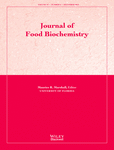Determination of Flavor Esters in Enzymatically Transformed Coconut Oil
Abstract
ABSTRACT
The lipase-catalyzed transesterification of coconut oil with fusel oil was investigated in this study. Various aroma-active octanoic acid esters, such as ethyl-, butyl-, propyl-, isobutyl- and (iso)amyl octanoate, were synthesized in addition to other esters. To determine the amount of flavor esters, a simple yet effective sample preparation method through refrigeration was developed to separate valuable fatty acid esters from monoglycerides, diglycerides and triglycerides. With this sample preparation method, gas chromatography coupled with mass spectrometry and flame ionization detector was applied to determine flavor esters in transesterified coconut oil with a total run time of 51 min. The levels of coefficient of variation were within 2% and the recovery rates were in the range of 89.5–100.0%, indicating good accuracy and high precision. The sample preparation and quantification method established appears to be useful for the determination of a wide range of fatty acid esters in oil samples.
PRACTICAL APPLICATIONS
Fatty acid esters, especially short-chain fatty acid esters, are important flavoring agents applied in the food industry. Using lipase as the biocatalyst to synthesize desirable flavor fatty acid esters from lipids and alcohols is gaining the interest of researchers, since the esters formed by this method are deemed as natural. The reaction equilibrium was achieved at around 20 h. For industrial production of flavor fatty acid esters, it is essential to monitor the amount of these target compounds in the reaction solutions. In this study we developed a simple and effective quantification method to determine the esters in transesterified coconut oil which may also be applicable for the analysis of esters in other oil samples such as lipid-derived biofuels.




